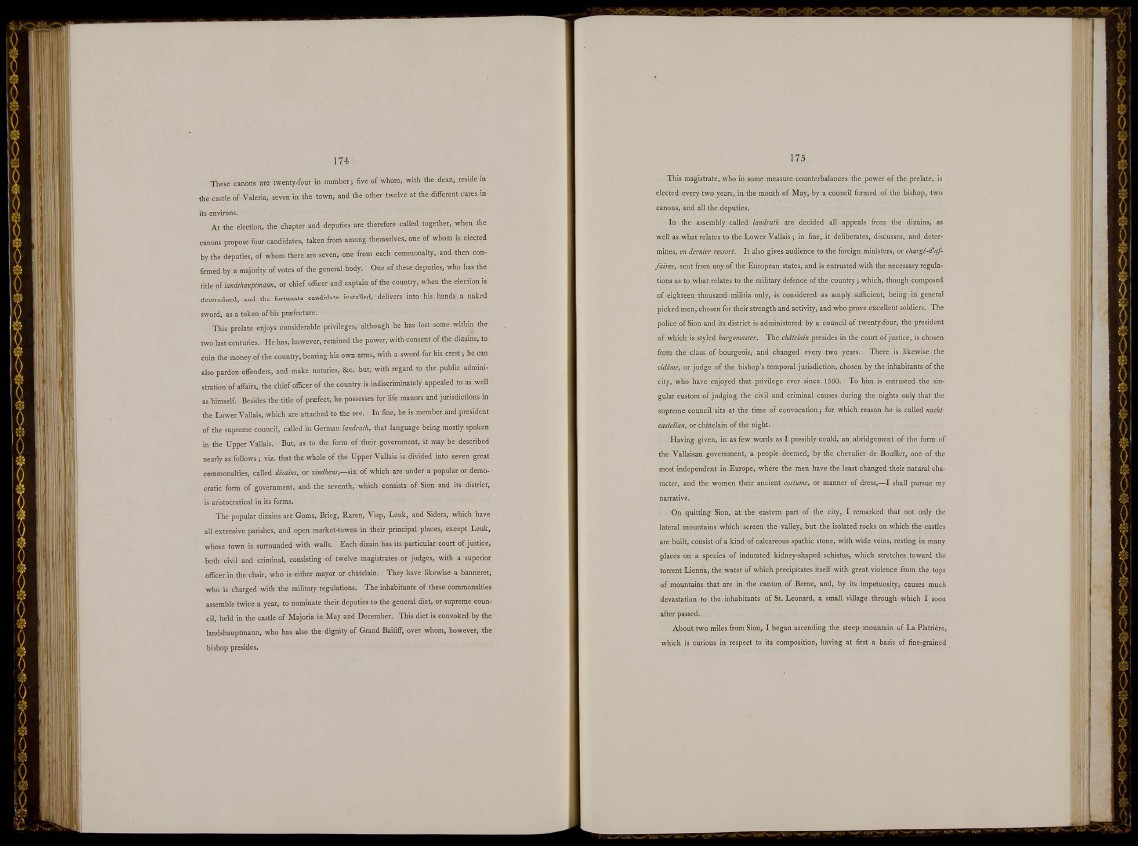
aSíS
These canons are twenty-foui in number i five of whom, witli the dean, reside in
the castle of Valeria, seven in the town, and the other twelve at tlie different cures in
its environs.
At the election, the chapter and deputies are therefore called together, when the
canons propose four candidates, taken from among themselves, one of whom is elected
by the deputies, of whom there are seven, one from each commonalty, and then confirmed
by a majority of votes of the general body. One of these deputies, who has the
title of iandibauplmmn, or chief ofScer and captain of the country, when the election is
determined, and the fortunate candidate installed, delivers into his hands a naked
sword, as a token of his pnefecture.
This prelate enjoys considerable privileges, although he has lost some within the
two last centuries. He has, however, retained the power, with consent of the dizains, to
coin the money of the country, bearing his own arms, with a sword for his crest ¡ he can
also pardon offenders, and make notaries, &c. but, with regard to the public administration
of affairs, the chief officer of the country is indiscriminately appealed to as well
as himself Besides the title of pnefect, h e possesses for life manors and jurisdictions in
the Lower Valíais, which are attached to the see. In fine, he is member and president
of the supreme council, called in German hndrath, that language being mostly spoken
in the Upper Valláis. But, as to the form of their government, it may be described
nearly as follows ; viz. that the whol e of the Upper Valíais is divided into seven great
commonalties, caUed dhains, or zivdhens—s\^ of which are under a popular or democratic
form of government, and the seventh, which consists of Sion and its district,
is aristocratical in its forms.
The popular dizains are Goms, Brieg, Raren, Visp, Leuk, and Siders, which have
all extensive parishes, and open market-towns in their principal places, except Leuk,
whose town is surrounded with walls. Each dizain has its particular court of justice,
both civil and criminal, consisting of twelve magistrates or judges, with a superior
officer in the chair, who is either mayor or châtelain. They have likewise a banneret,
who is charged with the military regulations. The'inhabitants of these commonalties
assemble twice a year, to nominate their depuries to the general diet, or supreme council,
held in the castle of Majoria in May and December. This diet is convoked by the
landshauptmann, who has also the dignity of Grand Bailiff, over whom, however, the
bishop presides.
175
This magistrate, who in some measure counterbalances the power of the prelate, is
elected every two years, in the month of May, by a council formed of the bishop, two
canons, and all the deputies.
I n the assembly called landratk are decided all appeals from the dizains, as
well as what relates to the Lower Valláis j in fine, it deliberates, discusses, and determines,
«t demie}- ressort. It also gives audience to the foreign ministers, or chargé-íaf'
faires, sent from any of the European states, and is entrusted with the necessary regulations
as to what relates to the military defence of the country ; which, though composed
of eighteen thousand militia only, is considered as amply sufficient, being in general
picked men, chosen for Üieir strength and activity, and who prove excellent soldiers. The
police of Sion and its district is administered by a council of twenty-four, the president
of which is styled burgomaster. The châtelain presides in the court of justice, is chosen
from the class of bourgeois, and changed every two years. There is likewise the
vidáine, or judge of the bishop's temporal jurisdiction, chosen by the inhabitants of the
city, who have enjoyed that privilege ever since 1560. To him is entrusted the singular
custom of judging the civil and criminal causes during the nights only that the
supreme council sits at the time of convocation -, for which reason he is called 7iacht
castellan, or châtelain of the night.
Having given, in as few words as I possibly could, an abridgement of the form of
the Vallaisan government, a people deemed, by the chevalier de Bouffler, one of the
most independent in Europe, where the men have the least changed their natural character,
and the women their ancient costunu, or manner of dress,—I shall pursue my
narrative.
On quitting Sion, at the eastern part of the city, I remarked that not only the
lateral mountains which screen the valley, but the isolated rocks on which the castles
are built, consist of a kind of calcareous spathic stone, with wide veins, resting in many
places on a species of indurated kidney-shaped schistus, which stretches toward the
torrent Lienna, the water of which precipitates itself with great violence from the tops
of mountains that are in the canton of Berne, and, by its impetuosity, causes mucii
devastation to the inhabitants of St. Leonard, a small village through which I soon
after passed.
About two miles from Sion, I began ascending the steep mountain of La Platricre,
which is curious in respect to its composition, having at first a basis of fine-grained
: fill
r t ! Iil 'i ,'r't
: 1
Í